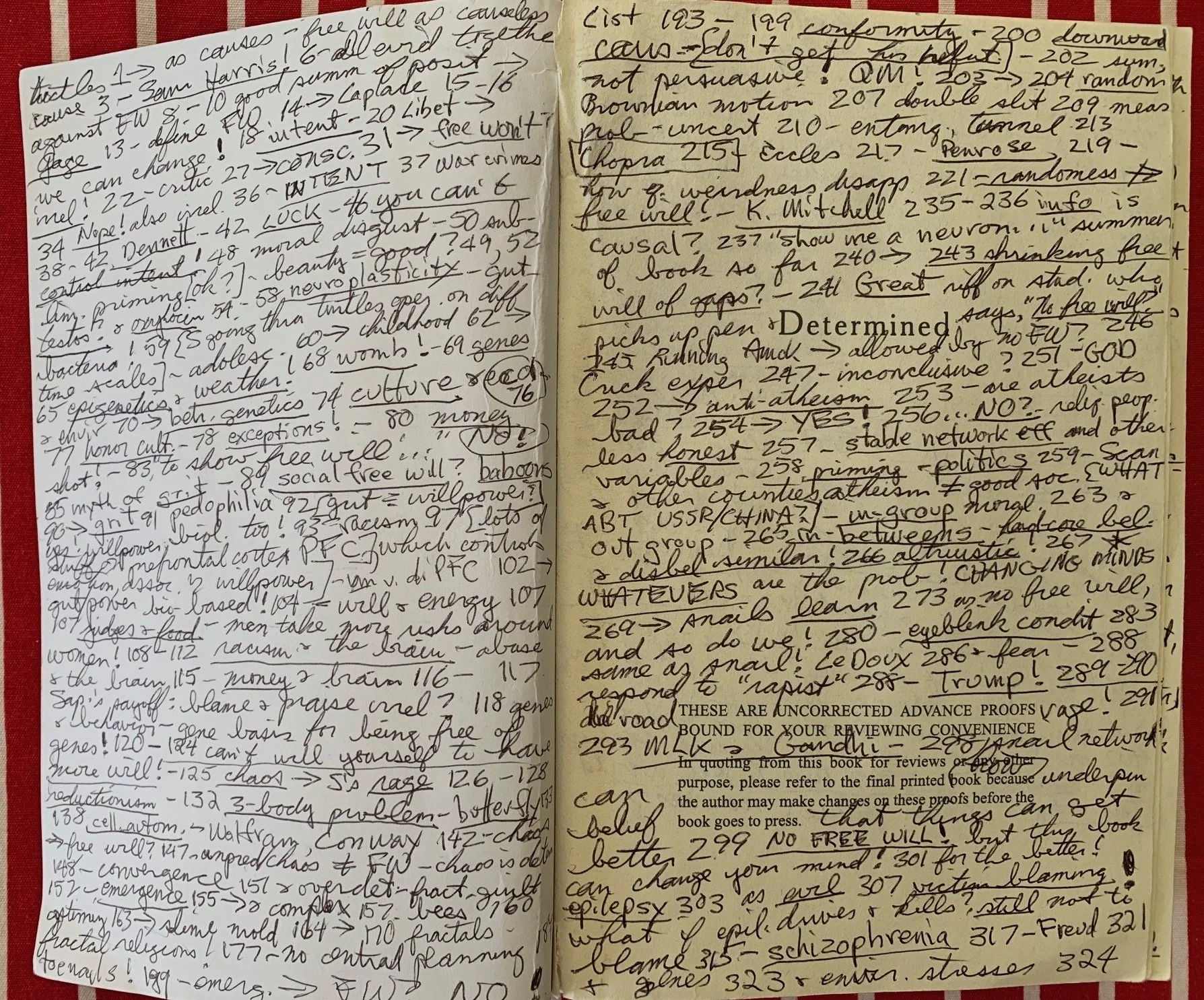Free Will and the Could-You-Have-Chosen-Otherwise Gambit
These are notes I jotted down in the front of Robert Sapolsky’s book Determined. These prove that I gave his anti-free-will argument careful consideration before rejecting it. Sapolsky’s argument wasn’t compelling enough for me to choose otherwise.
November 11, 2023. I didn’t intend to write a follow-up to my recent critique of Determined, neurobiologist Robert Sapolsky’s entertaining anti-free-will polemic. When free-will-deniers bashed my column, I told myself, Let it go, man, they can’t help themselves. (Yeah, I call myself man.) Then I spotted this display of macho materialism on Reddit. I felt compelled to respond, but how?
After much deliberation, I decided to address an especially insidious source of free-will denial. It is known as the “contra-causal” argument, but I choose to call it the could-you-have-chosen-otherwise gambit, or otherwise gambit for short. Sam Harris employs the otherwise gambit, and so does Sapolsky, implicitly.
The gambit asks you to recall a situation in which you made a choice. Now imagine an exact replica of you in exactly the same situation. Could you have chosen differently? This question is a trap. If you reply, Sure, I could have chosen otherwise, because I have free will, then you are saying your free will represents what Sapolsky derides as a “causeless cause.”
If you believe in causeless causes, you’re an anti-science, superstitious fool, according to macho materialists; you probably also believe in God, the primal causeless cause. (Free-will deniers tend to deny God’s existence, too.)
The otherwise gambit has always struck me as dumb. Of course an exact replica of me in an exact replica of this universe would make the same choice, because my reasons for making that choice would be identical. So what? The relevant, non-dumb question is this: Could that identical you, on the verge of making the same choice, encounter something that changes your mind?
Imagine—this is a far-fetched hypothetical, but bear with me--a Redditer posts a comment so brilliant that I reconsider my stance on free will; I decide not to write this column, or to write it in a different way. That’s my free will in action, because free will is nothing but conscious choices based on conscious deliberations.
Let’s raise the stakes here. You’re trying to decide whether to support a cease-fire in the Middle East. A New York Times op-ed tips you in one direction, an Al Jazeera video of dead Palestinian children tips you in the other. Your deliberations over what is right and wrong demonstrate the causal power of information and ideas. These aren’t “causeless causes,” whatever that means.
Are we subject to confirmation bias? Do we deliberate in bad faith, toward foregone conclusions, and make choices for irrational reasons? Of course! I certainly do, and so, I’m guessing, do you. But now and then we change our minds and hence actions for valid reasons. This is the free will I care about. If we did not possess this free will, there would never be any scientific or moral progress.
Does my position make me a compatibilist, someone who thinks free will is compatible with determinism? Ugh. I hate these philosophical labels. But I suppose I’m a compatibilist, if determinism encompasses not only strictly physical causes but also ideas like those in Sapolsky’s big book or in this little column.
How do ideas get transformed by the brain into conscious deliberations and decisions about what we should do? Science has no idea how this happens, but it clearly happens, all the time. That’s why I know free will is real, and why no one--not the macho materialists on Reddit and not even someone as wise as Robert Sapolsky--can convince me otherwise.
Further Reading:
You can watch my zoom talk with Robert Sapolsky here.
Free Will and the Sapolsky Paradox
Theories of Consciousness, Gaza and My Cognitive Dissonance
My Slam-Dunk Arguments for Free Will
For more on free will, consciousness, morality and other mysteries of mind, see my free online books My Quantum Experiment and Mind Body Problems.


